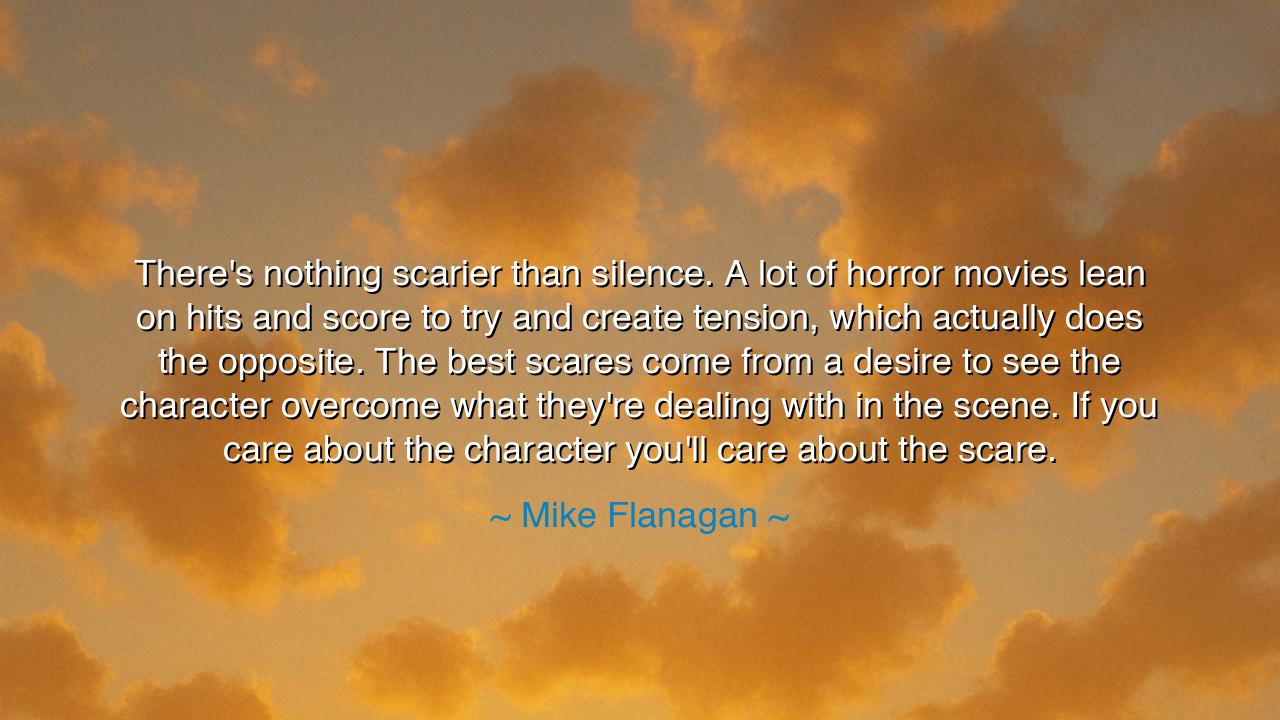
There's nothing scarier than silence. A lot of horror movies
There's nothing scarier than silence. A lot of horror movies lean on hits and score to try and create tension, which actually does the opposite. The best scares come from a desire to see the character overcome what they're dealing with in the scene. If you care about the character you'll care about the scare.






Hear, O children of story and shadow, the words of Mike Flanagan, the modern master of dread: “There’s nothing scarier than silence. A lot of horror movies lean on hits and score to try and create tension, which actually does the opposite. The best scares come from a desire to see the character overcome what they’re dealing with in the scene. If you care about the character you’ll care about the scare.” In these words lies a wisdom as old as the campfire, where humanity first wove tales of fear: that true terror is not born of noise, but of stillness, and not of monsters, but of our bond with those who face them.
For Flanagan declares that silence is the most powerful weapon of fear. In silence, the heart speaks louder, the mind creates unseen horrors, and the soul trembles at its own imagination. When music crashes and loudness reigns, the audience is startled, but not truly shaken; their fear is shallow, born of reflex. But when silence falls, when every creak of the floorboard and every breath of the character is shared with us, the fear becomes intimate. We lean forward, not because the filmmaker demands it with noise, but because our hearts are chained to the moment.
This truth is ancient. Recall the story of the Trojan Horse, when silence within the city walls was more terrible than the clash of armies outside. The Trojans, lulled by stillness, were undone by what they could not see, by the quiet that concealed their doom. Or think of the Battle of Gaugamela, where Alexander the Great held his men still in tense silence before the charge—no drums, no cries, only the dreadful quiet of men awaiting fate. In both war and story, silence is the breath before catastrophe, and it chills the soul deeper than noise.
But Flanagan also speaks of character, and here lies the deeper root of fear. If an audience does not care for the soul on the screen, no silence, no shadow, no monster will move them. The greatest scares come not because the creature is terrifying, but because we yearn for the fragile human being to endure. Consider the tale of Psyche in ancient myth, wandering alone through trials set by the gods. Her perils were dreadful, yet what makes them haunting is not the challenge itself, but our care for her struggle, our desire to see her overcome. So it is with cinema: the scare only matters if the heart is already invested.
Too many horror movies, Flanagan warns, rely on spectacle—the shriek of violins, the sudden crash of sound—to mask a lack of connection. But this is not true terror; it is only noise. True fear arises when we feel the character’s breath catch in their throat and recognize it as our own. It is when we watch them walk down a dark hallway and whisper within ourselves, “Please, let them survive.” In that shared vulnerability, fear transcends entertainment and becomes empathy.
The lesson, O listener, is not only for filmmakers, but for all who tell stories, and indeed for all who live. If you wish to move another soul, do not rely on tricks or noise. Cultivate silence, for in silence truth reveals itself. And care for the character, for when the heart of another matters to us, every trial they face becomes our own. In life, as in art, fear and compassion are bound together: we are afraid not of shadows, but of losing those we love.
Therefore, carry Flanagan’s teaching into your days. When you confront darkness—whether in stories or in life—do not fear the silence, but listen to it. It is in silence that we recognize our own heartbeat and the struggles of others. And when you tell your story, whether in art, in friendship, or in legacy, remember: people will not care about the spectacle of your life unless they care about you. Win their hearts, and they will follow you through the darkest of halls, caring for your fate as if it were their own.
Thus let it be remembered: silence is the truest terror, and sympathy is the root of all fear. For when we care for the character, we care for the scare; when we care for one another, even shadows themselves cannot break the bond of humanity.






AAdministratorAdministrator
Welcome, honored guests. Please leave a comment, we will respond soon